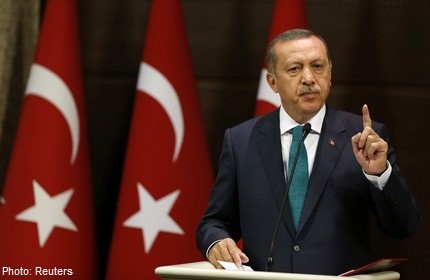Egypt expels Turkish envoy over Morsi row

CAIRO - Egypt announced Saturday it was expelling Turkey's ambassador, the latest souring of diplomatic ties that began when the Egyptian army ousted Islamist president Mohamed Morsi from power in July. Ankara said it would reciprocate.
Cairo's decision to send Ambassador Huseyin Avni Botsali home was in reaction to remarks by Turkish Prime Minister Recep Tayyip Erdogan Thursday in which he reiterated his criticism of Egyptian authorities for their ongoing crackdown on Morsi's Islamist backers.
Foreign ministry spokesman Badr Abdelatty told AFP Cairo had decided to "expel the Turkish ambassador and downgrade our ties to the level of charge d'affaires... declare the Turkish ambassador persona non grata and... not send our ambassador to Turkey."
Each capital had recalled its respective envoy in August, but while Botsali eventually returned to Cairo, Egyptian Abderahman Salah El-Din stayed home.
Abdelatty said the decisions were taken after Erdogan's latest remarks that were "provocative and interfering in Egypt's internal affairs."
On Thursday, Erdogan said in Russia: "I applaud Mr Morsi's stance against the judiciary. I respect him. I have no respect to those who put him on trial."
Morsi has been charged over the deaths of protesters during his turbulent one-year rule.
Soon after Morsi's July 3 ouster, Erdogan infuriated Cairo by calling the military's action a "coup."
Egyptian officials were also irked by Ankara's repeated calls for Morsi's release and for free and fair elections.
Cairo's ties with Ankara first soured when Erdogan condemned an August 14 crackdown by Egyptian security forces on supporters of Morsi in Cairo.
Egyptian forces broke up two sit-ins by Morsi supporters at Cairo's Rabaa al-Adawiya and Nahda squares on that day.
At least 627 people were killed in Rabaa al-Adawiya square itself, according to Egyptian officials.
The following day, Cairo and Ankara announced they were recalling their respective ambassadors for consultations.
But Erdogan said on September 4 that Ambassador Botsali would return to Cairo, while Cairo's envoy was still to return to his post in Ankara.
Ankara said on Saturday it would reciprocate.
"We will take steps in reciprocity after comprehensive consultations with the Turkish ambassador," foreign ministry spokesman Levent Gumrukcu told AFP.
But Turkish President Abdallah Gul sought to cool the situation.
"This situation between Turkey and Egypt is temporary and conjectural," Gul said in televised remarks.
"Turkey and Egypt are just like two halves of an apple on the two sides of the Mediterranean. We're very sad about what's going on in Egypt. I hope the relations will be back on track."
Turkey's Islamic-rooted Justice and Development Party (AKP) government had forged a close alliance with Morsi since he won Egypt's first free presidential election in June 2012.
Morsi was ousted following days of mass protests by millions against his turbulent year-long rule.
Millions of Egyptians took to the streets demanding the Islamist leader's resignation, blaming him for ruining an already dilapidated economy, monopolising power and working solely to fulfil the agendas of the Muslim Brotherhood movement, to which he belonged.
His ouster triggered instant international condemnation, which intensified after the authorities began cracking down on Islamists, which led to more than 1,000 deaths and thousands of arrests.
Washington even suspended a chunk of its annual $ 1.5 billion military aid to Cairo, in a move seen punishing Egypt's new leaders.
Egypt also recalled its envoy from Tunisia in September following Tunisian President Moncef Marzouki's call for Morsi's release.
The Egyptian envoy returned to Tunis on November 18.